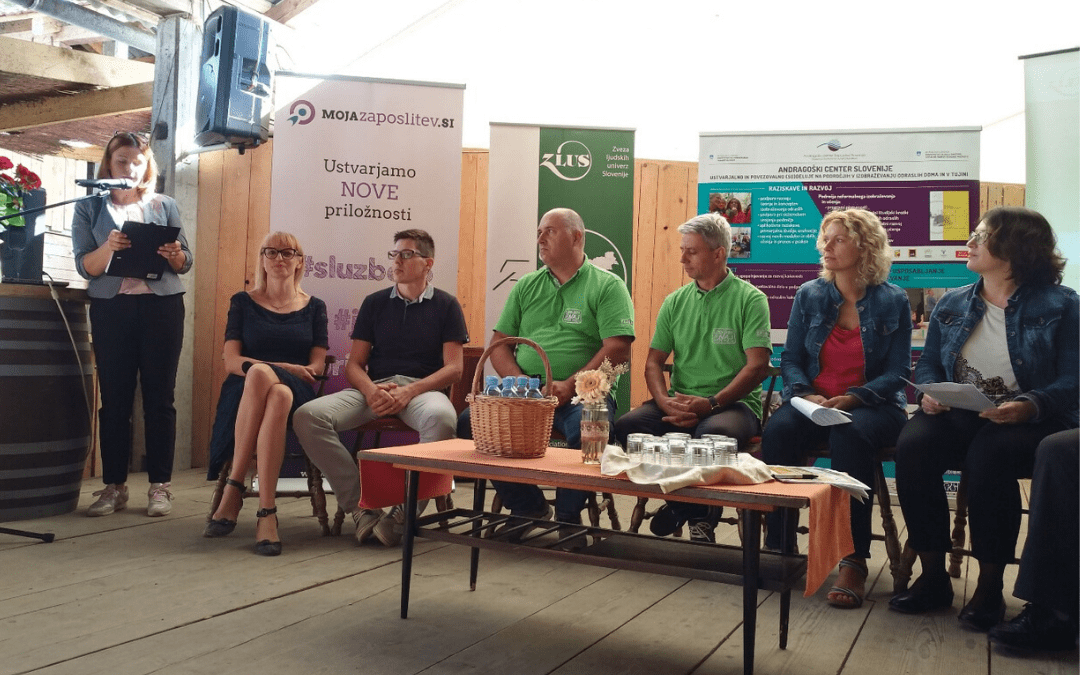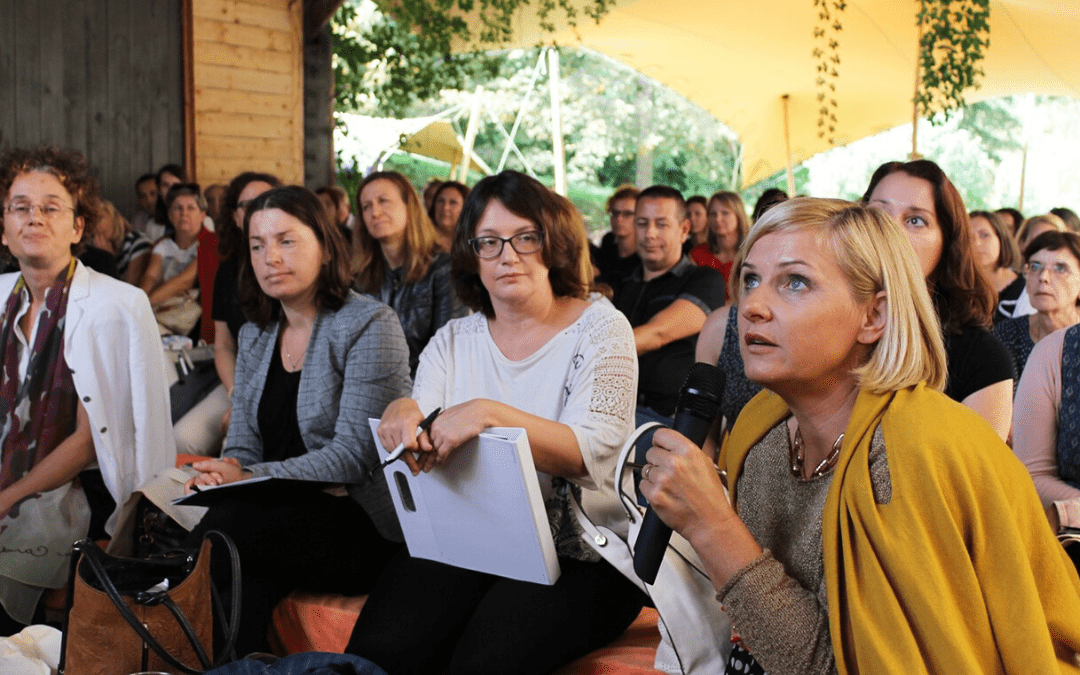Through the activities of the fourth phase of the EAAL project, we support the implementation of the European Council Recommendation Upskilling Pathways – New Opportunities for Adults. During the three EAAL consultation meetings, the last one was held in Ljubljana at the entrepreneurial breakfast entitled Does assessment of knowledge and skills development lead to more satisfied employees and employers? (in Slovenian), we have gathered stakeholders from different fields, mainly from the fields of adult education and the economy. The purpose of these meetings was to identify focal points and (potential) synergistic effects of cooperation. On the one hand, we were familiarised with policy measures, which pass into practice through calls and projects, financed primarily from the ESF. This has already introduced to us some cases which reflected the realisation of at least one of the three steps of the Upskilling Pathways: assessment of knowledge and skills that individuals already possess, development of learning opportunities tailored to the needs (of participants and the economy) and assessment and recognition of acquired knowledge and skills. All of these cases also strongly expressed the fourth dimension of the Upskilling Pathways which concerns the partnerships, coordination and cooperation of involved stakeholders to maximise the added value for everyone involved. Within this context, the local community plays a significant role.
Date and Venue: 11 September 2018, Ljubljana
Main Topic: Does assessing skills and developing competencer lead to greater satisfaction of employees and employers?
Coordinator: SIAE, Association of AEC of Slovenija (ZLUS), e-portal moja.zaposlitev.si
Invited stakeholders: representatives of MESS, the Ministry of Labour, Family, Social Affairs and Equal Opportunities, employers, AEC, University of Ljubljana, Faculty of Arts et al. – over 100 participants
Below I present a few events which will be presented on the EAAL Project e-portal as examples of good practice of realisation of Upskilling Pathways.
The Case from Ajdovščina: an analysis of the needs of the economy and InCastra
The very incentive role of municipal management has been highlighted at the aforementioned EAAL event, when Eva Mermolja, the director of Ajdovščina AEC, presented an analysis of the needs of the Ajdovščina economy for education and training of employees in the local community (in Slovenian). At the end of 2015, it was established which personnel was needed by the Ajdovščina companies up until 2025 and which skills they needed to have. From here the preparation of appropriate strategies for obtaining and strengthening both fundamental as well as professional skills is just a step away, while integrating into practice requires a lot more. To name a few: implementation of motivation programmes, consulting, design of plans for personal, vocational and professional development of employees and by all means the forms of training required to obtain the desired skills. The Ajdovščina AEC also plays a coordinating role, namely in the case of efficient management of older employees (45+) within the context of the project Comprehensive Support to Companies for Promoting Active Ageing in the Workplace (ASI). Demographic changes, rapid obsolescence of knowledge and the emergence of new professions, the need for intergenerational cooperation, and the like lead to the aforementioned.
Creating and implementing strategies are a long-term endeavour. However, in Ajdovščina they immediately decided to carry out InCastra – Ajdovščina Industry and Entrepreneurship Day. On the initiative of the Municipality and in cooperation with numerous partners, the Ajdovščina AEC organised a successful manifestation in 2017 and 2018. On the first day, the event was aimed at establishing contacts between schooling youth and companies – potential employers with guided tours and animation and education activities. On the second day, companies, societies and other partners, more than 40 participated this year, were able to introduce themselves face to face, at stands and through interaction with numerous participants.
In the presentation brochure of last year’s InCastra (from 21 to 22 September at Ajdovščina Airport) the mayor, Tadej Beočanin, wrote: “The future of the municipality is built on the experiences of the rich past, while at the same time we are upgrading the tradition with modern and high-tech activities.” As a visitor on the second day, I clearly felt these two dimensions of the Ajdovščina vision. However, I was particularly delighted with the pride and will for progress that I perceived in the event creators and visitors of all generations.
Investing in the training of older employees, Slovenj Gradec
“It is when I ventured on the path of personal progress, my personal growth started. It was in the same way that I also approached the training of my employees,” said Tanja Skaza, CEO of the Plastika Skaza company and an accomplished manager. She attracted heads of departments and their production workers to reading books and exchanging views about the novels, they have read.
This time Tanja was the key speaker at the 2nd Expert Consultation for employers which was organised by MOCIS, Slovenj Gradec AEC on 27 September under the title The Influence of Employee Training on Company Growth. On behalf of employers which MOCIS and partners address through ESF projects, the speaker was able to assure that companies were looking forward to free opportunities for upgrading the skills and knowledge of their employees. However, she sees key challenge in motivating, and even more so, in inspiring older, lower educated employees. In addition, she believes that setting an example is the most efficient model, and that is why she invited participants, especially human resource managers, to set an example for co-workers by taking part in continuous education. As an on-going (and ultimate?) goal of investing in own knowledge and skills, Tanja has repeatedly pointed out a happy and purposeful life.
At the event, MOCIS presented the first results of ESF projects aimed at advising and assessing as well as acquiring basic and professional skills in the Koroška Region. There are some shifts in this field, while the connections with employers are getting stronger. For MOCIS the biggest challenge is the shift in the mental orientation of the 45+ target group. This group needs constant encouragement or role models from their own environment to take the offer.
Sometimes it takes a lot of time for a mental shift to take place, but sometimes the tumultuous modern environment simply shoves us in this direction. The labour market is no longer an unconquerable fort and the number of unemployed – at least where sought-after professions are concerned – is low or non-existent, while the employers strive to obtain and keep high-quality workers (also by investing in them). Opportunities for obtaining current and fundamental skills are more numerous than ever. Because of all of this, almost everyone has a reason to feel self-confident, enthusiastic and to actively participate in designing their own life and career path. And with these optimistic thoughts I left Koroška Region, for which I wish, to keep (also through described efforts) more of their people on their sunny side of Koroška Region mountains.
This was also on the agenda of the Expert Consultation with the title Challenges of Company Performance, Profitability and Future that was organised by the Novo mesto AEC in cooperation with the Chamber of Commerce of Dolenjska and Bela krajina on 28 September. In this way, they and their partners wanted to assess the involvement of companies in consulting and employee training activities within the framework of both ESF projects. An additional motive for the exchange of views was the development of guidelines for drafting new programmes, with which they applied to the current MESS tender.
In the form of a world café, about 30 participants took part in a lively exchange of views on the above, as well as aspects of the partnership between employers and educators, and the transfer of skills into practice. Once more, the importance of basic and general skills has been confirmed, since many specific, vocational skills are provided by many companies and institutions themselves. The engagement of company representatives as well as the ESS, the Novo Mesto Regional Office, was also commendable. They act as the link between employers and educators. Since they have to operate in fierce market conditions and require qualified staff to do so, the need for a quick, flexible response of the latter to the needs of the employers was highlighted. The quality of educational services and their providers has been recognised as the highest imperative.
According to Gregor Sepaher, the Director of Novo mesto AEC, the meeting was an opportunity to strengthen contacts and cooperation. The awarding of acknowledgements to nine ambassadors of learning that have been selected through the tender procedure within the context of this year’s Lifelong Learning Week added a celebratory note to it. The inspiring cases of exemplary individuals and groups working on their own and common good added a touch of softness to the consultation, while the final round table put us back on solid ground.
As the author of the article, I participated in the discussion with the presentation of the EAAL project, which I see as an opportunity to increase the visibility of existing efforts in adult education, as well as to identify any gaps and challenges. The participants of the round table came from different backgrounds. However, we all advocated the necessity of developmental orientation, an indispensable partner of which is lifelong learning. If the identification of needs once marked the beginning of any process, monitoring of trends, their understanding and co-creation of changes and related needs are now more important. Yet there would not be any round table if there was no call for more humanity in everything we do.
Zvonka Pangerc Pahernik, MSc (zvonka.pangerc@acs.si), SIAE







